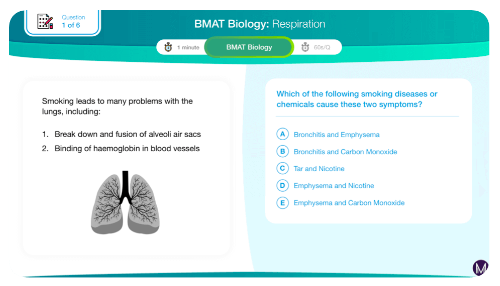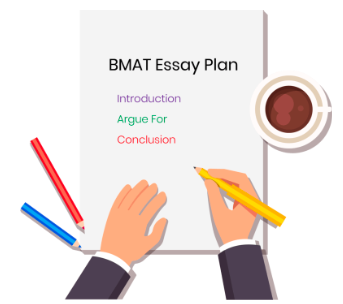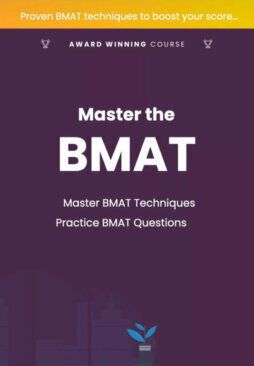UPDATE: Please note that CAAT have announced they will no longer be administering the BMAT in 2024, for 2025 entry. Cambridge University has announced that they will be using the UCAT as an admissions indicator. Oxford University are to announce admissions test changes in Spring 2024.
BMAT 2023: Introduction
The BioMedical Admissions Test 2023, or BMAT 2023 as it is more frequently known, is one of the admissions examinations that some universities around the world use to select applicants to medical, dental, biomedical, veterinary and health-related programmes. The BMAT gives candidates the opportunity to stand out from the crowd and show universities what they can do as these programmes are highly competitive and would have more capable applicants than there are seats available at universities.
It is distinct from the UCAT, which is a separate admissions examination for medicine and dentistry.
Instead, it tests your ability to apply scientific and mathematical knowledge, as well as problem-solving, critical thinking and written communication skills that are essential to university-level study.
The purpose of the BioMedical Admissions Test is solely to provide an assessment of candidates’ potential to succeed in an academically demanding undergraduate biomedical degree course. It is not designed to assess fitness to practise, which universities will assess in other ways. The test results are intended to be used as one component of the selection decision in conjunction with other information available to admissions tutors. Test items draw upon general academic skills and basic science knowledge, rather than recent specialist teaching.
The test has three sections: a 60-minute test of Thinking Skills, a 30-minute test of Scientific Knowledge and Applications, and a 30-minute Writing Task. The structure of each of these three elements is outlined below.
BMAT 2023 Sections
Section 1: Thinking Skills
Section 1 tests generic skills often required for undergraduate study. You have 60 minutes to finish this portion, which has 32 multiple-choice questions. “The questions are grouped into two different types: Problem Solving questions and Critical Thinking questions.
For Problem Solving questions, candidates are required to solve problems using simple numerical operations. For these questions, you will need to select relevant information, identify similarities between two different sets of information, and determine and apply appropriate procedures.
For Critical Thinking questions, candidates are required to present a series of logical arguments. For these questions, you will need to summarise conclusions, draw conclusions, identify assumptions, assess the impact of additional evidence, detect reasoning errors, match arguments, and apply principles.
Do note that calculators are not allowed for this section.
Section 2: Scientific Knowledge and Applications
Section 2 tests whether candidates have an appropriate level of core scientific knowledge and the ability to apply it. Questions will be restricted to material typically included in non-specialist science and mathematics courses in secondary education. Hence, no prior knowledge of medicine and dentistry is required, and students who have taken the subjects at GCSE or IGCSE level would be able to answer the questions in Section 2.
There is a detailed outline of the Section 2 content specification on the official Cambridge Admissions Assessment Testing website that you can view, but the main subjects tested are Biology, Chemistry, Physics, and Mathematics. Specifically, there would be 7 questions each for Biology, Chemistry, and Physics, and 6 questions testing your Mathematics skills.
Similar to Section 1, questions will also be in multiple-choice format and calculators are not allowed. However, you only have 30 minutes to answer the 27 multiple-choice questions in this section. Hence, speed as well as accuracy is important in this section. Do note that there are no penalties for incorrect responses, only marks for correct answers, so candidates should attempt all 27 questions. Each question is worth one mark.

Section 3: Writing Task
Your ability to choose, develop, and organise ideas, as well as your ability to convey them in writing clearly and effectively, will be examined in the last section of the exam. A selection of three tasks will be available, from which one must be chosen, and you have 30 minutes to write your response.
The three tasks that are given will include brief questions based on topics of general, scientific or medical interest. The question will provide a short proposition and will require you to explain the proposition, generate a counter-argument, and reconcile the two sides by offering a sort of resolution for the two opposing positions.
The Writing Task provides an opportunity for candidates to demonstrate the capacity to consider different aspects of a proposition and to communicate them effectively in writing.
Do note that while candidates may make preliminary notes, answers are strictly limited to one A4 page. This is to promote the disciplined selection and organisation of ideas, together with their concise, accurate and effective expression. Dictionaries or electronic spell-checkers are not permitted.

Is the BMAT required for Oxbridge?
Yes! Both the University of Oxford and the University of Cambridge require applicants to take the BMAT if they are applying to Medical or Biomedical related courses. Specifically, the University of Cambridge requires applicants to the A100 Medicine course to take the BMAT. On the other hand, The University of Oxford requires applicants to the A100 Medicine, A101 Graduate Medicine Entry, and BC98 Biomedical Sciences courses to take the BMAT.
Key Dates for BMAT Universities 2023
The BMAT is often offered on many occasions, with the two UK exam dates being in September and November. There are also additional days to take BMAT for medical schools abroad.
You must take the BMAT for the aforementioned Oxbridge degrees, and there is no exception to this. Verify whether the institutions to which you are applying require the BMAT since you must register for the test and pay the applicable fees before taking it. Ideally, this has to be done months before the actual test date.
The registration dates and timeline for the BMAT 2023 is yet to be published. Please visit the CAAT website to stay up-to-date with the dates, which should be published in March 2023.
When do I sit for the BMAT 2023?
Every applicant taking the BMAT in 2023 will have the option of sitting the BMAT in September or November.
Each BMAT exam date has advantages and disadvantages. Hence, think about which date will fit you best. If you need more advice as to what BMAT date to choose, we go into further detail about this in a separate article, which you can read here.
How is the BMAT 2023 Scored?
BMAT Section 1 and 2
Each question receives a single mark. Giving a wrong response does not result in a loss of points as there is no negative marking in the BMAT. Your final score ranges from 1.0 (the lowest possible mark) to 9.0 (the highest possible mark) based on your overall raw mark.
The median score is often around 5.0 and usually means that you answered half of the questions correctly. A good score is generally a score higher than 6.0, as only around 10% of test takers would score above this. 9.0 is the maximum score that you can receive. However, as the scale is based on the range of marks of all the candidates, you can answer a few questions incorrectly and still score a 9.0!
BMAT Section 3
Two examiners will grade your essay, and they will each assign you a different grade. You will be graded primarily on two factors.
The first factor is content, where you would be graded on a scale of 0 to 5. “The score given is dependent on how well you have addressed the question, how clearly you have organised your thoughts, and how appropriately you have applied your general knowledge and opinions.
The other grade, which ranges from A to E, focuses solely on linguistic quality. Your English grammar and sentence structure are evaluated, and whether you were able to express yourself using concise, compelling and correct English. Do note that vocabulary is not a marking point for this section, and conciseness is valued over flowery language!
The average of these two grades will be taken. This means that if your first marker gave you a 4A and the other gave you a 5C, your overall mark would be a 4.5B. It is often the case that both markers will give you a similar grade. If there is a large difference between the two, your script would be reviewed again. 5A is the maximum possible mark you are able to receive for Section 3. The most common content score in 2022 was 3, with only 5% of candidates obtaining a score of 4 or above.
More information is available here in our Section 3 Guide.
How do I Prepare for the BMAT?
BMAT Section 1
The formal specification, which will outline the precise subjects covered in Section 2, should be downloaded as soon as possible. In our experience, physics is the most challenging for the majority of students, but it’s important to keep in mind that physics will only make up 25% of the course material.
BMAT Section 2
The most important thing is to download the official content specification (which is available on the official Cambridge Admissions Assessment Testing website), as it will outline all the precise topics covered in each of the Section 2 subjects. This will allow you to know exactly what is tested, and for you to revise and/ or learn the topics that you are not familiar with.
In our experience, physics is usually the most challenging for the majority of students as not all of the students would have taken Physics at GCSE or IGCSE level. However, it is important to keep in mind that Physics will only make up 25% of the section. For extra advice, see our BMAT Physics study guide here.
We suggest visiting our past paper collection here, where we have compiled a list of questions which come up most frequently and provided explanations for each question. It is also organised neatly by section, where every past BMAT paper for each section from 2003 is available. It is also organised neatly by each of the four subjects (Biology, Chemistry, Physics, and Mathematics) if you would like to focus your practice on topics that you are weak in.
BMAT Section 3
For most people, this portion of the exam might be the most challenging. The best thing to do for practice is to try writing out several practice essays. You could start off by viewing some past year questions and attempting them without a set time restriction. To get into the swing of things, you can try to draft essay plans for all of the previous essay titles. As you get more familiar with your answering style and the type of questions posted, you can then further acquaint yourself with the test environment, by practising answering the essays on the sample specimen answer paper itself under simulated examination conditions. Additionally, you can try and get feedback for your essays from people around you.
It should go without saying that you should also try to read widely on a variety of subjects, including science, ethics, and current events. As anything under the sun could be tested for Section 3, you should try to start your revision for this as soon as possible to avoid cramming at the last minute. For extra advice, see our section 3 guide here.
FAQs
→What is the BMAT?
The BMAT (BioMedical Admissions Test) is an aptitude test used as part of the admissions process for medicine, veterinary medicine, and related courses at universities in the UK and overseas.
→What does the BMAT test?
The BMAT tests a candidate’s ability to apply scientific and mathematical knowledge, as well as their critical thinking and problem-solving skills. The test is divided into three sections: Section 1 tests problem-solving and critical thinking; Section 2 tests scientific knowledge and application; and Section 3 tests the ability to write a concise and persuasive essay.
→How can I prepare for the BMAT?
To prepare for the BMAT, candidates should review the official BMAT preparation materials and practice tests. They can also review scientific and mathematical concepts covered in the test, and practice critical thinking and problem-solving skills. It is also important to practice time management skills, as the test is timed and requires candidates to work quickly and accurately.
→Can I take the BMAT online?
You must take the test in an authorised testing facility and you cannot take it at home.
→What is a reasonable BMAT score?
The typical BMAT score is around 5.0, which roughly equates to around half of the questions being answered correctly. Only a few outstanding applicants would score above 7.0, and the top 10% of candidates will score around 6.0. Hence, any score above 6.0 would be considered good!
→Is the BMAT is harder than the UCAT 2023?
This answer to this question depends on your individual strengths and weaknesses. Certain students will find different sections of each exam more difficult because the UCAT and BMAT evaluate different skills. The BMAT may be better suited to pupils with good scientific reasoning as it needs GCSE science knowledge and incorporates essay writing. On the other hand, the UCAT may be better suited for students who are not as familiar with the GCSE-level scientific knowledge as it does not require any scientific knowledge. Instead, the UCAT could better suit students who have stronger cognitive abilities like abstract reasoning.
→How important is the BMAT in the admissions process?
The importance of the BMAT in the admissions process varies depending on the university and the course. Some universities place a high emphasis on the BMAT scores, while others may consider it alongside other factors such as academic achievements, work experience, and personal statement. Candidates should check the admissions requirements of the universities they are interested in applying to in order to determine the importance of the BMAT for their application.




Still got a question? Leave a comment